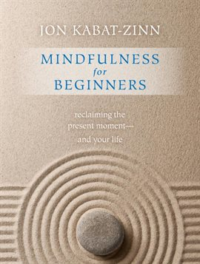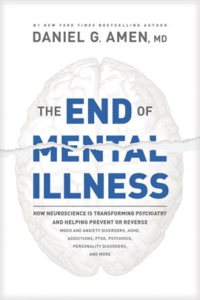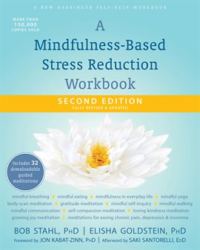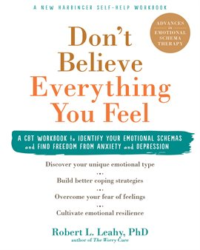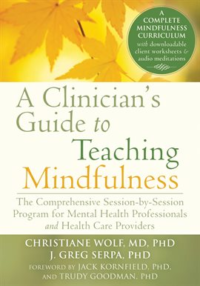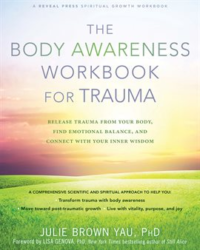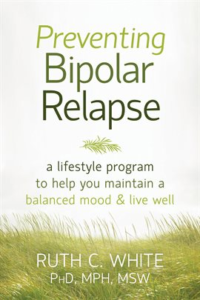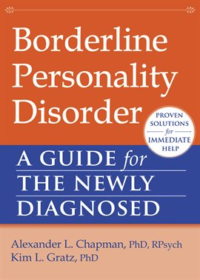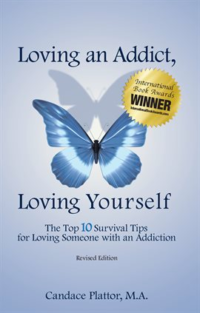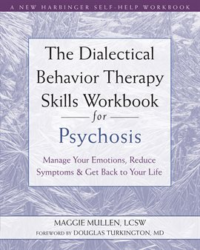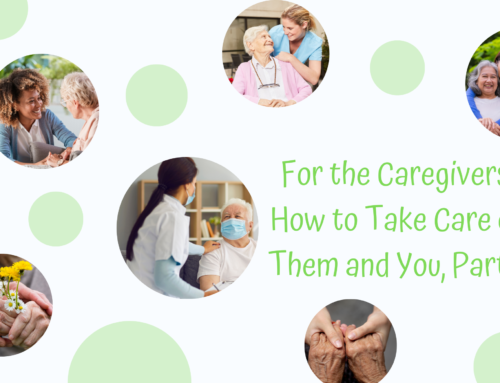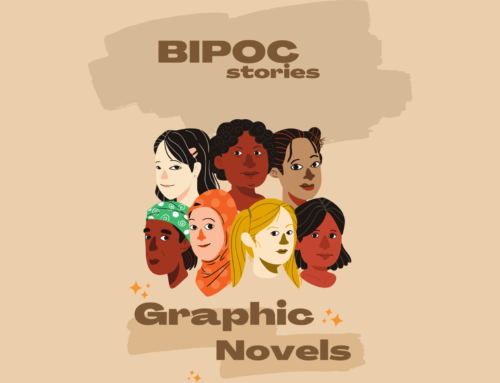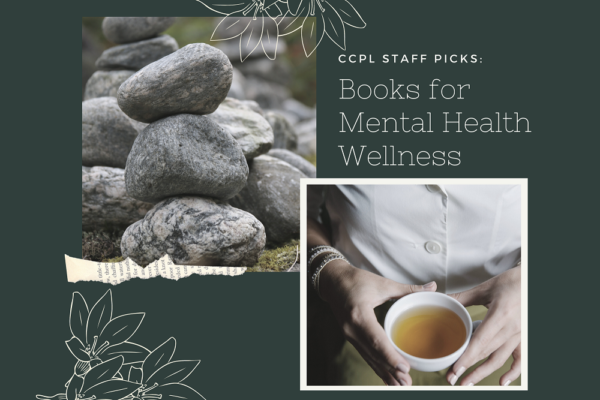
Sometimes life is hard. We have so many things that cause us stress or affect our mental wellbeing. Finding resources to learn how to destress, practice mindfulness, and learn ways to process emotions can be overwhelming. So, we did the hard work for you! Check out these CCPL’s recommendations for some great books on Mental Health Wellness from Hoopla. These publications were chosen for their quality of content and accessibility in digital format – so you do not have to leave home to enjoy these great reads!
If you are in crisis, or know someone who is, there are many resources that can help. These hotlines and organizations are free and available to anyone who is struggling. For a more comprehensive list, please visit PleaseLive.org.
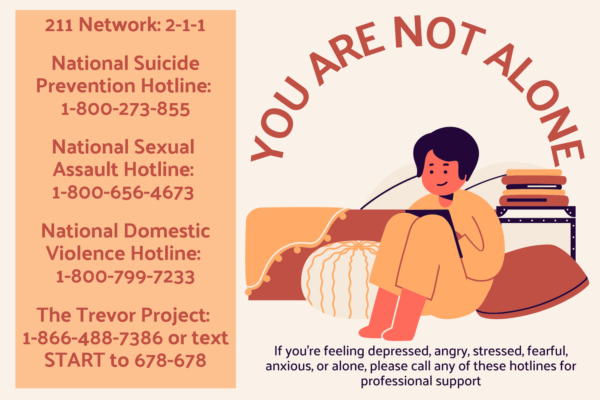
Mindfulness For Beginners by Jon Kabat-Zinn
Reclaiming the Present Moment–and Your Life
We may long for wholeness, suggests Jon Kabat-Zinn, but the truth is that it is already here and already ours. The practice of mindfulness holds the possibility of not just a fleeting sense of contentment, but a true embracing of a deeper unity that envelops and permeates our lives. With Mindfulness for Beginners you are invited to learn how to transform your relationship to the way you think, feel, love, work, and play-and thereby awaken to and embody more completely who you really are
The End Of Mental Illness by Daniel G. Amen, M. D.
How Brain Science Is Transforming Psychiatry and Helping Prevent or Reverse Mood and Anxiety Disorder
New hope for those suffering from conditions like depression, anxiety, bipolar disorder, addictions, PTSD, ADHD and more.
Though incidence of these conditions is skyrocketing, for the past four decades, standard treatment hasn’t much changed, and success rates in treating them have barely improved, either. Meanwhile, the stigma of the “mental illness” label-damaging and devastating on its own-can often prevent sufferers from getting the help they need.
Brain specialist and bestselling author Dr. Daniel Amen is on the forefront of a new movement within medicine and related disciplines that aims to change all that. In The End of Mental Illness, Dr. Amen draws on the latest findings of neuroscience to challenge an outdated psychiatric paradigm and help readers take control and improve the health of their own brain, minimizing or reversing conditions that may be preventing them from living a full and emotionally healthy life.
The End of Mental Illness will help you discover: Why labeling someone as having a “mental illness” is not only inaccurate but harmful. Why standard treatment may not have helped you or a loved one-and why diagnosing and treating you based on your symptoms alone so often misses the true cause of those symptoms and results in poor outcomes. At least 100 simple things you can do yourself to heal your brain and prevent or reverse the problems that are making you feel sad, mad, or bad. How to identify your “brain type” and what you can do to optimize your particular type. Where to find the kind of health provider who understands and uses the new paradigm of brain health.
A Mindfulness-Based Stress Reduction Workbook by Bob Stahl, Elisha Goldstein, Ph.D.
Part of the New Harbinger Self-Help Workbook series
The ultimate practical guide to MBSR-with more than 115,000 copies sold-is now available in a fully revised and updated second edition. Stress and pain are nearly unavoidable in our daily lives; they are part of the human condition. This stress can often leave us feeling irritable, tense, overwhelmed, and burned-out. The key to maintaining balance is responding to stress not with frustration and self-criticism, but with mindful, nonjudgmental awareness of our bodies and minds. Impossible? Actually, it’s easier than it seems. In just weeks, you can learn mindfulness-based stress reduction (MBSR), a clinically proven program developed by Jon Kabat-Zinn, author of Full Catastrophe Living. MBSR is effective in alleviating stress, anxiety, panic, depression, chronic pain, and a wide range of medical conditions. Taught in classes and clinics worldwide, this powerful approach shows you how to focus on the present moment and permanently change the way you handle stress. As you work through A Mindfulness-Based Stress Reduction Workbook, you’ll learn how to replace stress-promoting habits with mindful ones-a skill that will last a lifetime. This groundbreaking, proven-effective program will help you relieve the symptoms of stress and identify its causes. This fully revised and updated second edition includes new audio downloads, new meditations, and extensive chapter revisions to help you manage stress and start living a healthier, happier life.
Don’t Believe Everything You Feel by Robert L. Leahy
A CBT Workbook to Identify Your Emotional Schemas and Find Freedom from Anxiety and Depression
Find lasting freedom from difficult emotions with skills grounded in cognitive behavioral therapy (CBT) and emotional schema therapy.
If you struggle with difficult emotions, you should know that you aren’t alone. Many people feel sad, worried, or stressed out-whether as a result of depression, anxiety, or simply dealing with the common struggles of daily life. Emotions are a natural and healthy part of being human. It’s how we cope with these difficult emotions that reveal our true capacity for happiness, love, and joy.
Don’t Believe Everything You Feel offers a groundbreaking approach blending CBT and emotional schema therapy to help you explore your own deeply held personal beliefs about emotions, determine if these beliefs are helpful or harmful, and find the motivation to adopt alternative, healthier coping strategies. Each chapter contains exercises such as self-assessment, expressive writing, or guided questioning to help you manage your emotions more productively.
There’s no such thing as a “bad,” emotion. But if you’re experiencing sadness, anger, or anxiety most of the time, you need to find balance. This book will show you how to better cope with your emotions and live a full, meaningful life.
A Clinician’s Guide To Teaching Mindfulness by Christiane Wolf, J. Greg Serpa
The Comprehensive Session-by-Session Program for Mental Health Professionals and Health Care Provide
Mindfulness-based interventions have exploded in popularity due to their success in treating everything from everyday stress to more serious mental health conditions such as depression, anxiety, and post-traumatic stress disorder (PTSD).This breakthrough book provides professionals with a comprehensive, session-by-session guide to teaching mindfulness, complete with the scripts and training materials needed to teach introductory mindfulness in a wide variety of settings, despite theoretical background. Mindfulness-once an ancient practice honed in Buddhist monasteries-is now a mainstream, evidence-based, secular intervention employed by trained health and mental health professionals worldwide. The rapid spread of mindfulness increasingly involves psychologists, physicians, social workers, therapists, counselors, spiritual advisers, life coaches, and education professionals trained in their respective disciplines. Additionally, research continues to show that mindfulness is an effective treatment for anxiety, depression, stress, pain relief, and many other illnesses. If you are a professional interested in teaching mindfulness, this book will provide you with everything you need to get started right away. The introductory, six-week protocol outlined in this book is easy-to-use, and can be implemented in a variety of settings, ranging from an outpatient mental health clinic to an inpatient oncology clinic, from a substance abuse recovery program to educational settings. In addition, this book will tell you what to bring to each class; provides outlines for each session; offers scripts to help you differentiate the weekly meditative practices; and provides invaluable resources for further study and professional development. If you’re looking to integrate mindfulness into your professional work, this is your go-to guide.
The Body Awareness Workbook For Trauma by Julie Brown Yau
Release Trauma from Your Body, Find Emotional Balance, and Connect with Your Inner Wisdom
Move past trauma, balance your emotions, and reconnect with your body’s innate wisdom in The Body Awareness Workbook for Trauma. There is a piercing epidemic of trauma in the world today. Every few days there are reports of another tragedy, of more lives lost to gun violence, loved ones and family homes lost to floods, hurricanes, or fires. Women have come to speak openly about the trauma of sexual assault, and we are finally talking openly about the trauma inflicted on people of color, on transgender people, and immigrants. But now that this trauma is out in the open, how do we heal? For years, we’ve understood the connection between trauma and mental health issues, such as depression and anxiety. But somatic psychology has recently shown that our bodies hold on to trauma, and trauma can manifest in physical symptoms, such as pain, hormone imbalance, sexual dysfunction, and addiction. In addition, we now know that developmental trauma-trauma that emerges when basic childhood needs are not met-can result in profound emotional stress and lead to serious diseases. Building on this knowledge, this cutting-edge guide offers simple skills for connecting and calming your body, balancing your emotions, and rewiring old patterns of reactivity for better self-regulation. The mind-body approach in this book is designed to guide you away from post-traumatic stress disorder (PTSD) and trauma and toward posttraumatic growth. Using these exercises, you’ll learn how to reconnect and relate to your body-and yourself as a whole-in a new and healthy way. If you’re ready to move past your trauma and rediscover your body’s innate capacity for healing, growth, vitality, and joy, this unique guide will help light the way.
Preventing Bipolar Relapse by Ruth C. White
A Lifestyle Program to Help You Maintain a Balanced Mood and Live Well
If you buy just one book on bipolar disorder, let this be it. There’s an old saying: “Prevention is better than cure.” If you have bipolar disorder, this is especially true. For you, it’s incredibly important to read the warning signs of a possible episode. For instance, you may find you are not sleeping as well as usual, or you might be sleeping too much. You may stop doing things that you normally enjoy, or you may start acting out your impulses in ways that alienate those around you or get you into trouble. While the path to wellness for those with bipolar may involve psychiatric visits and medication adjustments, preventing manic and depressive episodes is the true key to staying healthy and happy. So how do you do it? And most importantly, how can you keep yourself motivated? In this powerful, breakthrough book, bipolar expert Ruth C. White shares her own personal approach to relapse prevention using the innovative program SNAP (Sleep, Nutrition, Activity, and People). White also offers practical tips and tracking tools you can use anytime, anywhere. By making necessary lifestyle adjustments, you can maintain balanced moods, recognize the warning signs of an oncoming episode, and make the necessary changes to reduce or prevent it. This is the first and only book on bipolar disorder that focuses exclusively on prevention. To help you stay well, White includes links to helpful online tracking tools so that you can manage your symptoms, anytime, anywhere. If you are ready to stop living in fear of your next episode, this life-changing book can help you take charge of your diagnosis-and your life.
Borderline Personality Disorder by Alexander L. Chapman, Kim L. Gratz
A Guide for the Newly Diagnosed
Borderline personality disorder (BPD) is a serious personality disorder marked by extreme, fluctuating emotions, black-and-white thinking, problems with interpersonal relationships, and in extreme cases, self-harm. If you have recently been diagnosed with BPD, you likely have many questions. What treatment options are available? How do you tell your friends and loved ones? And what are the common side-effects of medication? A diagnosis of BPD can definitely change your life, but it can also be a catalyst for personal transformation and growth. In Borderline Personality Disorder: A Guide for the Newly Diagnosed, two renowned experts on BPD present an easy-to-read introduction to BPD for those who have recently been diagnosed. Readers will learn the most common complications of the illness, the most effective treatments available, and practical strategies for staying on the path to recovery. This book is a part of New Harbinger Publications “Guides for the Newly Diagnosed” series. The series was created to help people who have recently been diagnosed with a mental health condition. Our goal is to offer user-friendly resources that provide answers to common questions readers may have after receiving a diagnosis, as well as evidence-based strategies to help them cope with and manage their condition, so that they can get back to living a more balanced life. Visit www.newharbinger.com for more books in this series.
Loving An Addict, Loving Yourself by Candace Plattor, M.A.
The Top 10 Survival Tips for Loving Someone with an Addiction
Are you feeling exasperated and helpless about your family member’s addiction? Are you at your wit’s end, having tried everything you can think of to make them stop? If someone you love is engaging in addictive behaviors such as alcohol and drug misuse, eating disorders, smoking, gambling, Internet addiction, sex addiction, compulsive overspending, or relationship addiction, you are undoubtedly experiencing unpredictability in your relationship. Some of the most common emotions you will experience include: Guilt and shame; Anger and anxiety; Confusion and powerlessness. Whether the addict in your life is your spouse, partner, parent, child, friend, or colleague, the key to changing this reality for yourself lies in shifting your focus from your loved one’s addiction to you own self-care. This book presents a dramatically fresh approach to help you get off the roller-coaster chaos of addiction, maintain your own sanity and serenity, and live your best life.
The Dialectical Behavior Therapy Skills Workbook For Psychosis by Maggie Mullen
Manage Your Emotions, Reduce Symptoms, and Get Back to Your Life
Powerful and effective skills to help you manage psychosis, take charge of your emotions, and get back to living your life.
Based in dialectical behavior therapy (DBT), this first-of-its-kind workbook offers real skills to help you balance your emotions and stay grounded in reality. You’ll find self-assessments, worksheets, and guided activities to help you understand your symptoms and manage them in day-to-day life. You’ll also gain self-awareness, learn to navigate difficult or stressful situations, and discover healthier ways of interacting with others.
If you have a history of psychosis or suffer from psychotic spectrum disorder, you know how difficult it can be. You may experience paranoia, auditory hallucinations, and emotional dysregulation. In addition, you may feel alienated from your friends and family if they have trouble understanding what you’re going through. The good news is that you can move beyond the stigma of psychosis, regain hope, and rebuild your life. This compassionate workbook will help you get started.
In this workbook, you’ll learn the core skills of DBT to help you feel better:
- Mindfulness
- Distress tolerance
- Emotion regulation
- Interpersonal effectiveness
You’ll also find important information on relapse prevention-including warning signs to watch out for, what to do if you have another episode, and an extensive resource list to help you manage your symptoms. And finally, you’ll find a wealth of practical tools that can be used every day for long-lasting psychosis recovery. People with psychotic spectrum disorders often struggle with paranoia, auditory hallucinations, poor concentration and memory, and emotional dysregulation. Unfortunately, there are very limited resources available to them, outside of therapy. At long last, The Dialectical Behavior Therapy Skills Workbook for Psychosis teaches readers powerful and evidence-based skills to help them manage their emotions and reduce symptoms so they can get back to living their lives.
Maggie Mullen, LCSW, is a clinical social worker, national trainer, and community activist with over a decade of experience helping people navigate psychosis. They specialize in culturally responsive, evidence-based care for psychotic spectrum disorders, trauma, post-traumatic stress disorder (PTSD), the LBGTQ+ community, and formerly incarcerated people. As a training director at Kaiser Permanente, they take great pride in mentoring and teaching the next generation of social workers. Maggie lives in Oakland, CA, with their spouse and two cats. You can find out more online at http://maggiemullen.org.
Foreword writer Douglas Turkington, MD, is a major research figure within the history of the development of cognitive behavioral therapy (CBT) for schizophrenia. He is a fellow of the Royal College of Psychiatrists, and founding fellow of the Faculty of Cognitive Therapy in Philadelphia, PA. He has written more than one hundred articles and more than half a dozen books on the subject of CBT for psychosis. Turkington lives in Newcastle, England. Mullen resides in Oakland, CA.

